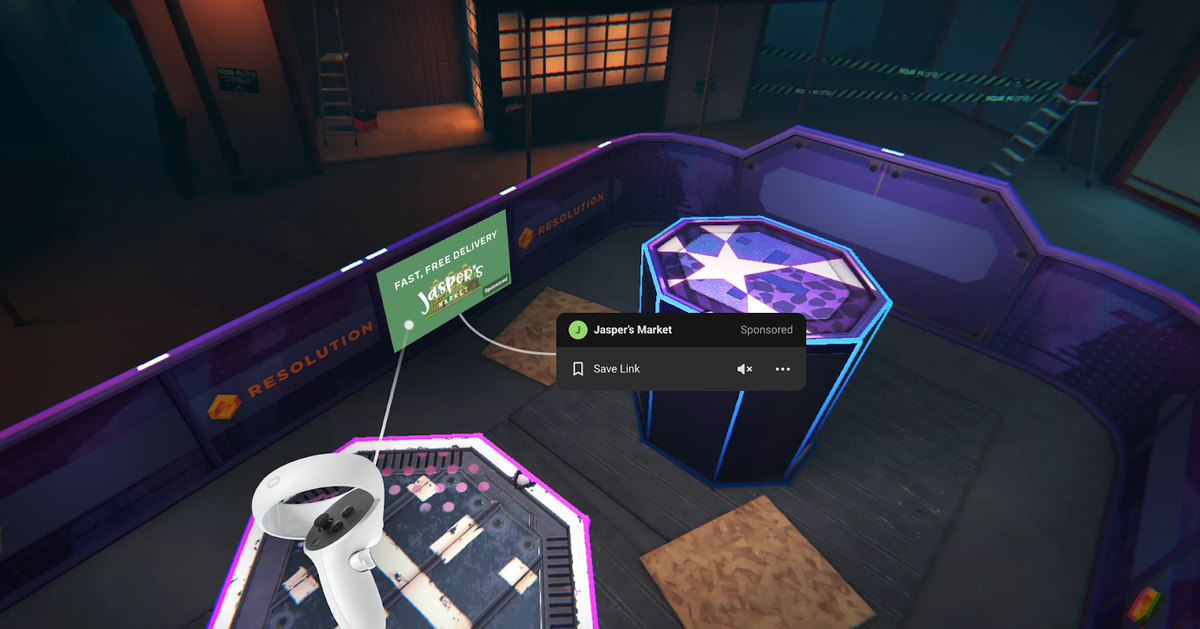Facebook will start putting ads in Oculus Quest apps
Source: The Verge added 16th Jun 2021Facebook will soon begin testing ads inside its Oculus Quest virtual reality system. In the coming weeks, ads will start appearing inside the Resolution Games title Blaston as well as two other unnamed apps. Facebook will later expand the system based on user feedback, saying it aims to create a “self-sustaining platform” for VR development.
Facebook introduced ads on the Oculus mobile app last month, and it’s used limited Oculus data to target Facebook advertising since 2019, but this is its first major foray into putting ads inside the Oculus VR platform itself. “Once we see how this test goes and incorporate feedback from developers and the community, we’ll provide more details on when ads may become more broadly available across the Oculus platform and in the Oculus mobile app,” the company said in a blog post.
As on Facebook’s non-VR apps, you can block specific posts or companies from appearing in ad slots. And Facebook says it’s not changing how it collects or analyzes user information. It says that some of the most sensitive data — like raw images from Oculus headset cameras and weight or height information from Oculus Move fitness tracking — remains solely on users’ devices. Also, Facebook says it has “no plans” to target ads based on movement data or recordings from its voice assistant.
A Facebook spokesperson says the system will use information from your Facebook profile, as well as “whether you’ve viewed content, installed, activated, or subscribed to a Oculus app, added an app to your cart or wishlist, if you’ve initiated checkout or purchased an app on the Oculus platform, and lastly, whether you’ve viewed, hovered, saved, or clicked on an ad within a third-party app.”
As shown above, users can click an ad and either open it or save the link for later. The former option will launch a landing page in the Oculus Quest’s web browser, and the latter will save the ad in the Quest in-VR experience and Oculus mobile app’s Explore sections. Developers will get a share of the revenue from ads in their apps, but Facebook isn’t publicly revealing the percentage.
Facebook is leaving its future roadmap open-ended. The spokesperson says Facebook hasn’t determined, for instance, whether ads could eventually appear inside your Oculus Home experience. Facebook also isn’t yet identifying the other apps using advertisements, although it will list additional names in the coming weeks. The first ads look like standard boxes inside game interfaces, but Facebook’s blog post says it’s exploring other options as well. “We’re currently investing in unobtrusive ads as a new way for developers to build businesses — and though we’re not quite ready to test them yet, we’re also exploring new ad formats that are unique to VR,” it says.
VR has arguably been an advertising medium for years, with countless film and TV promotional tie-ins as well as novelty experiences from companies like McDonald’s and Ikea. But ad-supported VR apps are using a different model that more closely resembles that of the mobile and web ecosystem. Letting developers integrate advertising could create a greater incentive to work within Facebook’s official ecosystem rather than distributing through sideloading options like SideQuest.
Facebook says ads are part of an attempt to figure out profitable business options in the growing but often difficult field of VR app development. “This is a key part of ensuring we’re creating a self-sustaining platform that can support a variety of business models that unlock new types of content and audiences. It also helps us continue to make innovative AR/VR hardware more accessible to more people,” says the blog post.
Facebook currently dominates consumer VR with its Oculus Quest 2 headset — which, at $299, is one of the cheapest options on the market. It’s also acquired the studios behind several major VR games, including rhythm game Beat Saber and the battle royale title Population: One. While it may face renewed competition from a second-generation Sony PlayStation VR headset next year, at least one VR company has retreated from consumer hardware in part because of Facebook’s influence: Vive creator HTC, which has called Facebook’s low-cost consumer headsets “artificially subsidized” by the company’s advertising-focused business model.
Meanwhile, Facebook has slowly strengthened ties between its central business and Oculus, which it acquired in 2014. It began requiring Facebook logins for Quest headsets last year, although users can maintain separate profiles and use pseudonyms in VR. Adding advertising isn’t a surprising move for the company — and it’s another signal that Oculus hardware is becoming ever more closely integrated with Facebook.
brands: Creator Experience First HTC incentive It Key Mobile New Oculus One other party PlayStation Profile Quest Reality Sony Unique media: 'The Verge' keywords: App Facebook Fitness Games Mobile Playstation TV
Related posts
Notice: Undefined variable: all_related in /var/www/vhosts/rondea.com/httpdocs/wp-content/themes/rondea-2-0/single-article.php on line 88
Notice: Undefined variable: all_related in /var/www/vhosts/rondea.com/httpdocs/wp-content/themes/rondea-2-0/single-article.php on line 88
Related Products
Notice: Undefined variable: all_related in /var/www/vhosts/rondea.com/httpdocs/wp-content/themes/rondea-2-0/single-article.php on line 91
Warning: Invalid argument supplied for foreach() in /var/www/vhosts/rondea.com/httpdocs/wp-content/themes/rondea-2-0/single-article.php on line 91
